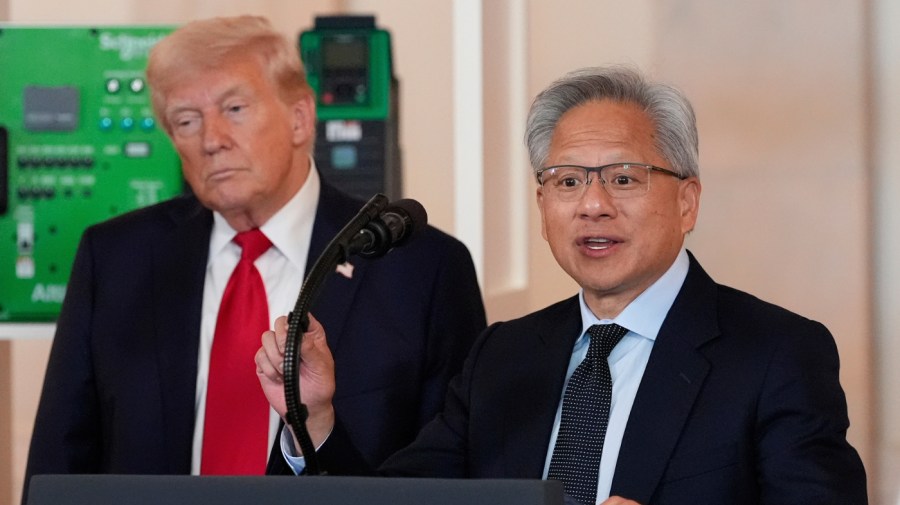Last month, the Trump administration and Nvidia worked out what some have called an unusual and surprising deal for the latter to export its defeatured AI chips.
That is, President Trump reversed a decision made by his own administration to decategorize Nvidia’s H20 and AMD’s chips as a national security risk in a deal that includes a 15 percent levy to the U.S. government on sales of those chips.
Trump then followed up with a number of executive orders and an AI Action Plan. In general, U.S. and foreign AI companies, so long as they are not ideologically biased against his administration, will more or less be given a green light to build major AI infrastructure projects.
Furthermore, AI products manufactured in the U.S. could be exported to non-allied countries, including China, albeit with export controls through U.S. Department of Commerce.
Around the same time, Trump reached a deal with Intel for an unprecedented 10 percent government stake in the company.
For the general public to understand the above calibration of market-orientation and “America First” priorities, the pillars of national security marketism must be explained.
Here, economic security is the same as national security, in which both U.S. and foreign companies are not only reigned in, but are expected to align their operations to constitute the current administration’s objectives, both in political and economic terms.
This is called corporate statism, a distinct outcome from China’s state capitalism whereby corporate groups form the basis of society and the state.
In recent decades, China’s one-party system has effectively utilized its state capitalism to constitute itself as a superpower and remake the world into a bipolar power system.
Yet, on the other side of the power system, the Trump administration appears to be aiming to, at least initially, claim exclusive and singular power of the presidency to usher a variation of state capitalism in the United States.
In the administration’s eyes, doing so could decouple the U.S. from China, upend the bipolar power system and lessen the economic and military rise of China.
It’s likely Trump’s national security marketism will entail a “rent system” for both U.S. and foreign companies, requiring them to pay forward when innovating and making profits.
Trump has also threatened tariffs on American brands in order for U.S. products to be more broadly consumed at home and abroad.
Additionally, in ushering in his version of state capitalism, his technocrat bureaucracy is devaluing previous American pillars of diversity and inclusion. In their place will be the idiom that personal, domestic and economic security are national security.
It’s no secret that in recent decades a growing segment of the American public has been discontent with the status quo. And, thus, an openness to a different political wind that could promulgate a reshaping of the American way of life.
What has not been fully understood, though, is the emergence and variation of state capitalism in the U.S.
While the term state capitalism generally connotes negative externalities and single-party systems like in China, state capitalism has been studied through the lens of variations and varieties.
Variations of state capitalism can be observed in all nation-states, as each country’s government, based on their culture and history, designs their unique political and economic aspirations and goals.
In the field of varieties of state capitalism, a number focus on and have been predicting the downfall of existing capitalist societies, such as in China, whereas others focus on the continual forms of state capitalist countries.
The above is to say that there is another way to understand and assess the Trump administration and its venture into state capitalism.
Rather than predicting when the state intervention of the Trump administration and the MAGA wing of the Republican Party will fail, it could be more politically and economically astute to realize and accept that the U.S. has likely crossed the Rubicon of returning to its status quo.
In so many words, perhaps the story now is how will the Trump administration execute its state capitalism: vertically or horizontally.
Overall, the Trump administration has been accelerating the vertical aspect of the aforementioned rent system, technocrat bureaucracy and threats to tariff American brands that could significantly rock the U.S.’s healthy consumer economy and normalize today’s volatile stock market.
However, if the Trump administration pivots to a more horizontal state capitalism, in which key stakeholders and their interests are accounted for, Trump’s state capitalism might have some real legs.
While Trump’s state capitalism is still unfolding and subject to legal and political challenges, it is fueled by a deep-rooted shift in public sentiment and domestic politics that see America losing its way and has created the ideal conditions for Trump to take a playbook straight from China.
It is indeed uncharted territory where the status quo is being reshaped before our eyes.
Long Le is an associate teaching professor at the Leavey School of Business at Santa Clara University.
Copyright 2025 Nexstar Media, Inc. All rights reserved. This material may not be published, broadcast, rewritten, or redistributed.
For the latest news, weather, sports, and streaming video, head to The Hill.

